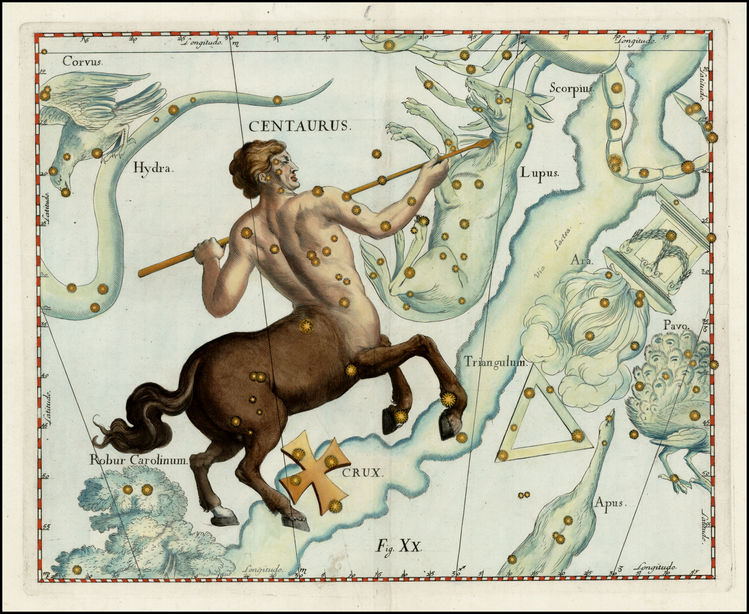Völund's Son, Vidga
The Horseman and his Stallion Skemming
by Peter Krüger
©2013
[Germanic Astronomy]
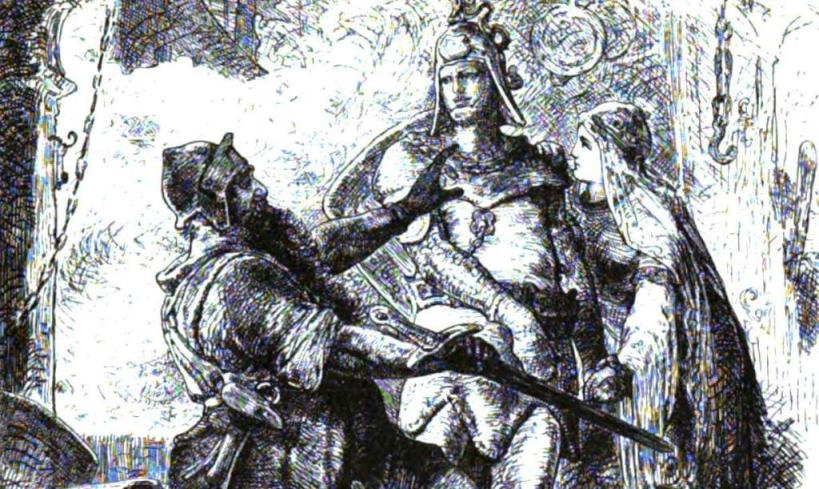
Völund and his Son Vidga
The Rosengarten zu Worms (Rose Garden at Worms, Version D IX, 316), a 13th century German poem is not a key source of Germanic mythic tradition. However, it preserves a remarkable statement about the hero Vidga/Witege/Wittich, son of the famous smith Völund/Velent/Wieland, who received, as an inheritence from his father, the sword Mimung and the horse Skemming/Schemming:
| ‘Also
sprach der voget von Berne: daz solt du glouben mir: vellest du den risen, ich will es lonen dir. Daz solt du glouben, Witege, uzerwelter man: Schemminc daz guote ros will ich dir wider lan Daz brahtest du uz dem berge von dem lieben vater dine. Helt, nu velle den risen: es sol din eigen sin. Ez wart mir do vor Garte, do du strite mit Amelolt. Ich wil dir’z wider lazen: helt, verdiene den solt. Do sprach der helt Witege: würde mir daz untertan, So wolte ich willecliche den risen groz bestan.’ |
Thus spoke the Reeve of Bern (Dietrich): this you
shall believe me,
if you slaughter the giant, I will reward you
This you shall believe me, Witege, chosen one
Schemming, the good stallion, I will give you back
that you brought out of the mountain from your
beloved father
Hero, now slaughter the giant: (and) it will be your
property (again)
I got it in front of the garden, when you fought
with Amelolt
I will give it back to you, hero, earn your pay.
Thus spoke the hero Witege: if (the horse) would be
given back to me
than I will deliberately stand ground against the
tall giant.
|
Dietrich of Bern promises to give Witege his horse Schemming back from if he fights the giant Asprian with his sword Mimung. The stallion is said to be ‘brought out of the mountain’. This comment surely refers to the story in Thidrekssaga af Bern, where Velent is taught how to forge inside of a hollow mountain by two dwarves. After the death of his father Vadi, Velent kills the dwarves with his father's sword and leaves the mountain with an unnamed horse. Chapter 61, in the Edward Haymes translation (1988), reads:
|
Velent gengr nu út, skyggnir at
feðr sínum ok sér hann hvergi ok gengr í eina fjallshlið ok sér,
hvar nýhlaupin var ein skriða, ok kemr honum í hug, at sú skriða
mun fyrirfarit hafa feðr hans, ok sér, at eigi er þar gott til
hefnda at leita, ok minnist á, hvat faðir hans hafði ráðit
honum, áðr þeir skildist, hyggr nú at, hvar er hrískjarrit, þat
er Vaði risi fal sverðit í, ok er hrískjarrk upp gengit allt. Nú
þykkir Velent, mikill vandi á síuu mali, faðir hans er nú dauðr
ok hann sjálfr til dauða ráðinn. (90) Litast hann nú um ok sér, hvar upp koma sverðshjölt ór jörðunni. Ok gengr Velent ok kippir upp sverðinu ok sér á ok mælti: "Hví mun ek þurfa nú at fela mér it verra?" Hann sér, hvar dvergarnir standa á einu bergi ok sjást um. Gengr Velent upp á bergit ok hefir sverð undir skauti nökkvit ok lætr þá eigi sjá, gengr at þeim, er honum var nærri, ok höggr banahögg, ok því næst drepr hann báða þá. Nú gengr Velent inn í bergit ok tekr tól þeira öll ok allt gull ok silfr, er hann má við fara. Ok eitt hross klyfjar hann af gulli ok dýrum gripum, er dvergarnir áttu, ok þó tók hann sér byrði sem mesta fekk hann borit, vendir nú norðr til Danmarkar. |
"Velent went outside to look
for his father. He went along a mountainside and saw where a
landslide had recently fallen, and it came into his mind
that the landslide might have killed his father, and he saw
that it was not good to expect help there, and then he
remembered what his father had advised him before they
parted. He thought now where the brushwood had all grown up.
Velent thught his situation very serious: his father was
dead and he himself was sentenced to death.
Then Velent went into the mountain
and took all of their tools and all of the gold and silver he
could carry. He loaded a horse with the gold and precious
treasure that had belonged to the dwarfs. He took as great a
burden as he could carry and went north toward Denmark."
He looked around and saw where the sword's hilt came out of the ground. Velent went over and pulled out the sword, looked at it and said 'How shall I manage to hide it?' He went where we saw the dwarfs were standing on a mountain and looking around. Velent went up on the mountain and he held the sword under the flap of his cloak and did not let it be seen. He went toward them, and when he was near enough he struck a deathblow and killed them both. |
Shortly afterwards, Velent comes to a river, where he builds an enclosed vessel from a hollowed out log. He then places the tools and treasures inside, climbs aboard, seals the craft and causes it float down the river and out to sea. The horse is not mentioned in this context anymore. Several chapters later, it suddenly reappears under the name Skemming in a scene where Velent is fighting a group of seven man with his masterwork, the sword Mimung:
|
Nú ríðr Velent
á sínum góða hesti Skemmingi. Hann hafði fengit þann góða hest
sunnan af hrossastóði því, er Studas inn gamli ok fyrr var frá
sagt, hafði at varðveita. En sá hestr var svá skjótr sem fugl
fljúgandi ok alla vega mikill ok fríðr. |
Now
Velent rode his good horse Skemming. He had gotten the horse from the horse-farm where —as has been told—Studa the Old was caretaker. This horse was as fast as a flying bird and was great and fine in all respects. Velent rode away in the night and went as far in a day as the king had covered in five days. He arrived before the castle at midnight and took the victory stone and rode back to the king's tent before the sun rose in the east. Now Velent let his horse Skemming gallop as in a tournament, and seven men from the king's tent came to meet him and to give the horse water." |
I have previously explained this scene as the rising of the stinger of the constellation Scorpio (= the sword Mimung) causing the setting of the Plejades (=the group of seven warriors). Therefore, if the horse Skemming were also a constellation or an asterism, it should rise about the same time as the scorpion’s stinger.
Therefore, if we look to this region of the starry sky with the help of Aratus Phainomena, we find some relevant information:
‘Below the fiery sting of the dread monster, Scorpion, and near the South is hung the Altar [Ara].’
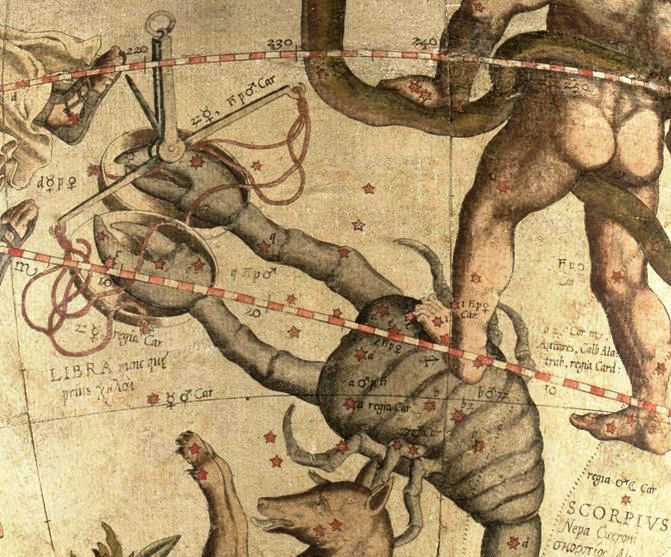 |
|
 |
|
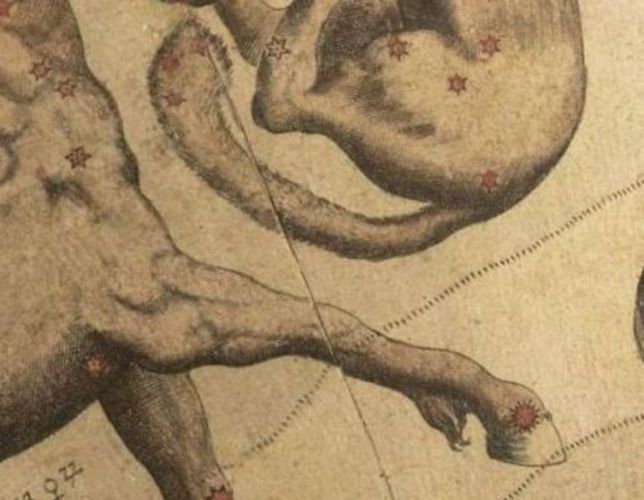 |
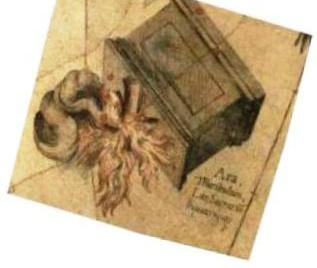 |
So, this area is associated with the South – and Velent gets his horse from the south! And next to the Altar, indeed, we find a horseman, or to be more accurate a creature that is half man, half horse, a Centaur:
‘The constellation of Centaur [Centaurus] thou wilt find beneath two others. For part in human form lies beneath Scorpio, but the rest, a horse’s trunk and tail, are beneath the Claws. He ever seems to stretch his right hand towards the round Altar, but though his hand is drawn and firmly grasped another sign – the Beast [Fera], for so men of old have named it.’
Overall, it might be possible that Witege, depicted as a horseman (Centaurus), fights with Mimung (the stinger of Scorpio) against a giant (the constellation Orion) —another variant of the Scorpio-Orion myth.
The name Skemming/Schimming itself is quite transparent. It is a variant of the German ‘Schimmel’, a grey or white horse. Therefore, it has the same meaning as the name of Sigurd’s horse Grani, normally translated as ‘the grey one’. In Völundarkviða 14, when Völund (Velent) is captured by king Nidhad (Nidung), Nidhad inquires where Völund has obtained his great wealth, remarking Gull var þar eigi á Grana leiðo ("There was no gold on Grani's path"), suggesting that Grani was the name of Völund's own horse. The word 'schimmel' has the same root as the verb ‘to shimmer’ - very appropriate for a constellation.
Later, Witege/Vidga undertakes many adventures together with Dietrich of Bern. At last, in the poem Rabenschlacht, Vidga with the sword Mimung kills two sons of Etzel/Atli (this may be a reference to the constellation Gemini, the Twins. If so, this would be a variant of the killing of the two dwarves) and Dieter, the brother of Dietrich.
In the end, Dietrich, seeking revenge, chases Witege who flees on his horse Skemming. Witege comes to a seaside cliff, jumps into the water and was never seen again. This scene might also be be explained by the location of the Centaur.
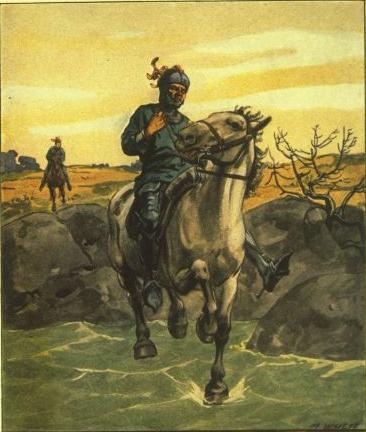 |
The Centaur stands on the Milky Way and on the other side of the Milky Way the region of the starry sky starts that is known in Greek astronomy as ‘the waters’, the sea.
